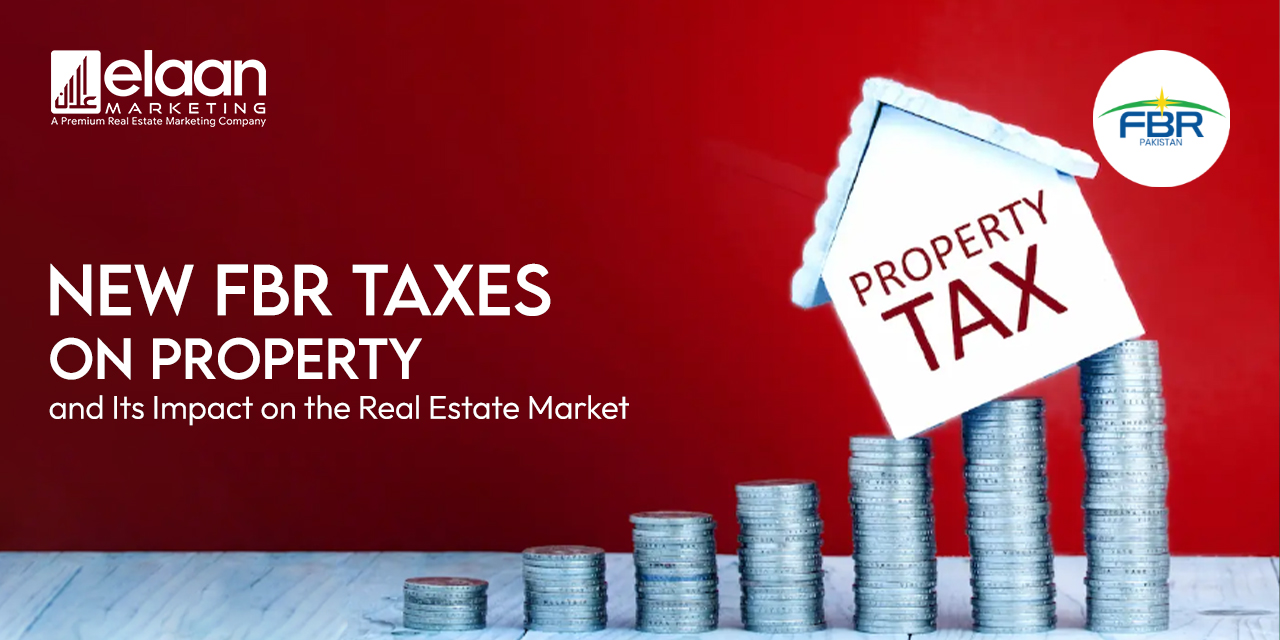New FBR Taxes on Property and Its Impact on the Real Estate Market
Syeda Manal Tirmizi
July 2, 2025

The Pakistan real estate market is experiencing a massive restoration due to the new real estate taxes imposed by the Federal Board of Revenue (FBR). It is altering the way people buy, sell, and invest in property. Whether you’re a first-time homebuyer, a seasoned investor, or a family owner of land, the reforms impact you somewhat.
Major Changes Introduced by FBR
One of the significant changes is the introduction of tax on notionally-earned rental income. This will be charged to individuals who own more than one property. Even if your second or third property is not being rented, the government will estimate a rental value and tax it. That has attracted considerable attention among many middle-class investors who do not receive regular rental income but are being taxed on it nonetheless.
The Capital Gains Tax (CGT) has been amended, and it is now costlier for property sellers to sell property within a short time after purchasing it. This amendment primarily targets investors who purchase and sell in a short while to make a profit. Real estate transaction taxes have also been raised, particularly for non-registered taxpayers (non-filers). Finally, the FBR has revised its tables of property values, so taxes will now be calculated on higher and more realistic values of properties than before.
Short-Term Effect on the Market
The market response has been quick and cautious. Bookmakers are waiting on the sidelines, tentative about the additional expense and what lies ahead. Even committed supporters are reluctant to make buys. Sellers, on the other hand, are struggling, often forced to drop prices to stay competitive in an ever more uncertain climate. Property agents think there are fewer transactions taking place, even in the hottest investment areas like DHA, Bahria Town, and other big housing schemes in Islamabad, Lahore, and Karachi. There is a slowdown, and it is not regular it is a deeper issue.
Reason for the Policy Changes
These tax reforms are not arbitrary; they are a part of a larger agenda of legalizing the economy and discouraging tax evasion. For years, individuals utilized Pakistan’s real estate as a haven for hundi money. By adding restrictions tax regulations, the FBR aims to eliminate black money, bring more individuals into the tax net, and put property transactions at international levels. These reforms are also connected with engagements with international organizations such as the IMF, which have asked Pakistan to implement tougher financial regulations.
Development of Investment Practices
In the long run, the tax changes could alter the real estate sector. Investors will not purchase homes just to offload them in a short period and will instead aim for careful, long-term strategies, such as collecting rent or constructing affordable housing. The trend may shift towards compliance with the law, record-keeping, and investment for value and not fast buying and selling for fast returns. The old “buy and hold for years without worrying” model is being replaced by a more formal, controlled, and taxed model. Initially, this will slow things down, but it might bring more stability and integrity to the business in the long run.
Conclusion
The FBR’s new property tax regime has altered the market mood. There is fear, there is doubt, but there is also the sense that the business-as-usual is over. While some regard it as Setback to investment others hope that it marks the beginning of a more transparent, better real estate culture for Pakistan. How successful these adjustments are will be determined by how well they are enforced and how equitably they are applied. For the moment, it is certain that all the players in real estate must adapt, adjust, and keep up.
Frequently Asked Questions(FAQs)
What is the deemed rental income tax?
It is a novel form of taxation where the state presumes that you are making some money out of your property although you may not be. So, if you have more than one house and it is unoccupied, you will still be taxed on an estimated rental value as determined by the FBR.
Does the tax apply to all property?
No, usually it is referring to properties that are not your primary residence. If you own a vacation home, a parcel of land, or any other property that you, or your immediate household members, are not occupying, that’s when this tax comes into effect.
How has Capital Gains Tax (CGT) changed?
If you sell an investment a few years after you purchase it, you will now pay a higher CGT than before. The longer you hold the asset, the less you pay in CGT but short-term investors are certainly under pressure.
Are House Prices Likely to Decline?
In the majority of areas, yes due to the additional taxes, the buyers are negotiating a tougher bargain and sellers are reducing the price to make a sale. The market declined, and prices in some areas are already becoming cheaper.
